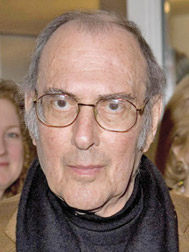Reminiscing over Harold Pinter

There was a time I enjoyed the ‘Absurd Theatre’ although I didn’t
understand its influence and impact then becoming a trend in European
and American theatre world. Among such playwrights who fashioned the
genre was the British playwright and successful film scriptwriter Harold
Pinter.
What was prevailing as a tradition of realist drama, Harold Pinter
brought in a revolution in Modern English Drama. As Katherine J Worth
has characterized, Pinter’s plays had elements of the detective play and
the cocktail comedy. Elaborating on that V E Amend says: Isolated
elements in his plays are intensely realistic; the combination of
elements is utterly absurd.
Knowledgeable readers would agree that an authority on the ‘Absurd
Theatre’ is Martin Eslin. According to him “Pinter uses language as a
vehicle and instrument of dramatic action. Words become weapons in the
mouths of Pinter’s characters.”
We must know enough of the ‘Existentialist’ background of Harold
Pinter to understand him well. Beginning with naturalism (wrongly
understood as realism) moved towards what was known as expressionism as
practised by such playwrights as Strindberg. That is to say the idea of
personal feelings of the dramatist in expressions is what it means. And
as a continuing process, Pinter ended with the philosophy of
existentialism.
Here is a brief summary of existentialism:
 |
|
Harold
Pinter |
The great Greek philosopher Plato believed in essence of things –a
hard structure of beliefs mainly religious. But Existentialism rejects
earlier beliefs. What this philosophy means is that essence stands
before existence.
We might remember some of the pronouncements of existentialists like
the French philosopher Jean Paul Sartre who said that the ‘Other people
Hell’. Even others like Samuel Beckett and Ionesco, fellow
existentialists professed the idea that ‘God is dead’. All this were
said to project their own personality and assert their individuality.
Influenced by these ideas Harold Pinter wrote his plays in that
tradition. His play ‘The Dumb Waiter’ illustrates this tendency. Menace
is a key factor in his themes- the idea of fear. Communication is
another problem for his characters. Man is in a position not being able
to communicate and lives in psychic agony.
Martin Eslin summed up what the core of Harold Pinter’s work as a
dramatist: “Man’s existential fear, not as an abstraction, not as a
surreal phantasmagoria, but as something real, ordinary and acceptable
as an everyday occurrence.”
Harold Pinter consciously acknowledges Samuel Beckett’s influence on
him: “I admire Beckett so much that something of its texture might
appear as my own.”
The British critic John Russell Taylor wrote 40 years ago that “we
can observe the paradoxes – that Pinter is at once the least realistic
of contemporary British dramatists; that his world seems the smallest
and most private, and yet he covers a wide range of English society, a
greater variety of human emotions, than any one else – and still come
back to an elementary take –it or leave –it judgment of the finished
plays.”
****
Marginalizing Myself
Things have changed over the years. Now I am neither fascinated by
the Absurd Theatre nor am an admirer of the great contributors to
European culture, arts and philosophy nor am I enthusiastic in reading
powerful writing from across the Atlantic. Undeniably beginning with the
‘Angry Young Men’ up till the 1980s I was a keen follower of the trends
in Western culture and the like. I am in the Margin these days
responding more to the eastern spiritualism in consonance with my aging.
I like to read more occidental literature and philosophy and eastern
music than what fascinated me in my teenage and adolescent years.
However, occasionally I like to read contemporary fiction and poetry
written in English and listen to symphonic music of the western
composers.
I find Lankan and Indian Writing in English, Tamil and Sinhala and
translations of works into English from various Indian languages are
worth reading to understand the immediate world around me.
This column henceforth will concentrate more on such aspects of
culture. Further, even if we are Lankans, what’s happening in our local
Tamil literary world is not adequately covered in the English print and
electronic media. Being a Tamil, in the absence of others coming forward
to report, inform, evaluate such happenings, I would like to continue to
concentrate on such artistic and literary activities in these columns.
Readers’ comments and responses on the writing in this column are
welcome for greater understanding among us.
[email protected]
|



